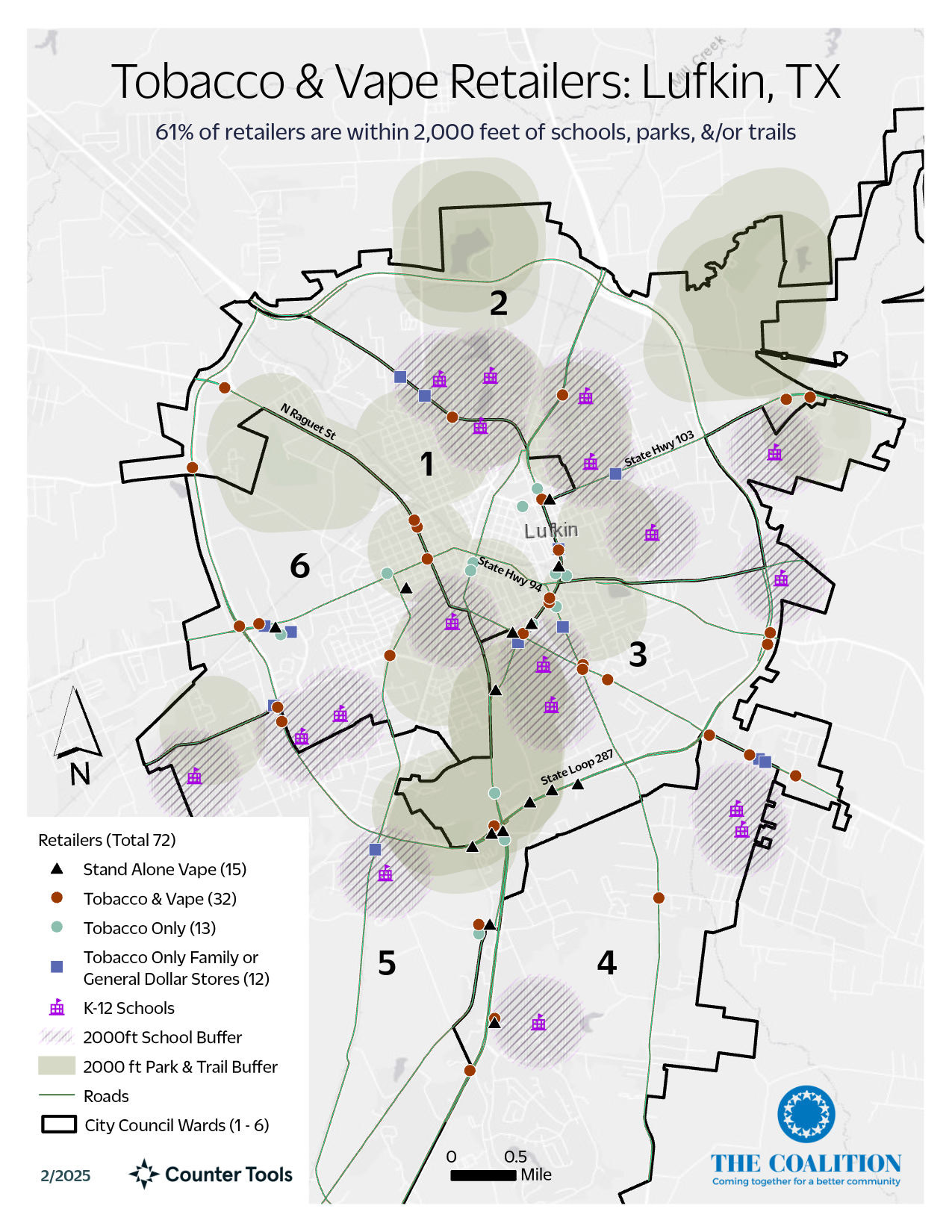What happens when community passion meets powerful data? In Lufkin, Texas, it led to a landmark win for youth health. With the rising number of tobacco and vape retailers in the community, The Coalition in Angelina County knew it was time to act. In August, their advocacy work led the Lufkin City Council to approve an amendment to the city’s zoning ordinance, restricting new vape retailers to specific districts and requiring significant distance from schools, churches, and other sensitive areas.
Community support for this change was fueled by growing concerns about the health effects and rising use of electronic nicotine products among youth. One of the biggest drivers of youth tobacco use is the retail environment, where harmful substances such as tobacco and nicotine products are marketed and sold, often in appealing flavors directly targeted towards youth.
To strengthen the case for change, Counter Tools partnered with The Coalition to support their advocacy work by providing tobacco retailer density and proximity maps of Lufkin, Texas.
Tobacco retailer density refers to how concentrated tobacco outlets are in a neighborhood, often measured as retailers per 1,000 people. High density increases exposure to advertising and makes tobacco more accessible, leading to higher rates of use among both youth and adults. Proximity measures the distance to the nearest retailer, in feet or miles. The closer the store, the easier it is for young people to be exposed to products and marketing. Research shows that high density and close proximity fuel disparities: youth initiation rises, people who smoke consume more, and quit attempts are less likely to succeed. Reducing density and proximity is key to protecting community health.
These maps visually demonstrated how 61% of tobacco retailers were clustering close to schools and parks within a 2,000-foot radius, raising the risk of youth exposure to marketing and easy access to nicotine. By presenting data in a clear and compelling way, The Coalition was able to strengthen its case and mobilize community support. Data visualizations that highlight the need for change are often the turning point in advocacy, transforming abstract data into a persuasive story to influence policy and create healthier environments.
“The tobacco retailer maps from Counter Tools were a powerful tool in our advocacy
efforts. A quick glance at our map shows the high number of vape shops in our rural
town of only 35,000 people. This was tangible proof that it was time for our community
to act and protect our youth from further exposure to these harmful products.”
Sharon Kruk, Executive Director | The Coalition
With the passing of this ordinance, new e-cigarette and vape retail shops require a special use permit and are zoned to light and heavy manufacturing districts, which are mostly on the outskirts of town and away from residential zones. Importantly, the ordinance sets a 1,000-foot buffer zone around schools and churches, safeguarding youth by preventing vape retailers from clustering near places they frequent. Existing vape shops will not be impacted by this ordinance unless they are closed for more than six months, in which case they would have to apply for a special use permit. Additionally, the ordinance does not apply to stores with vape products bringing in less than 50% of the store’s revenue.
Counter Tools celebrates this milestone alongside The Coalition and community leaders in Lufkin, Texas. Their work sets a positive example for other cities looking to address youth tobacco use at the point of sale. With each local victory, we move closer to a healthier future where all youth can grow up free from the influence of commercial tobacco.





